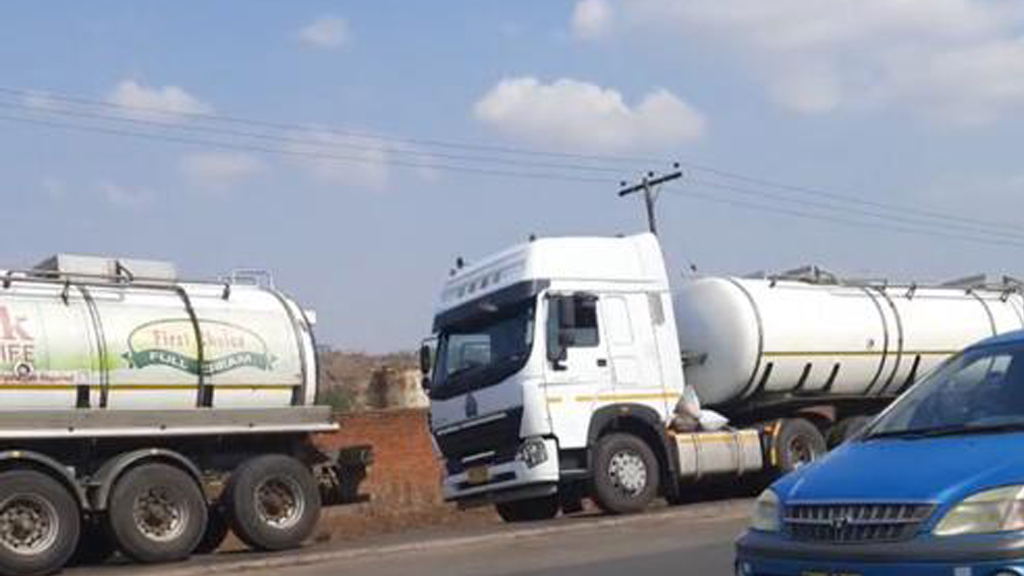The Malawi dairy industry is a successful subsector supporting over 20,000 small scale rural farmers throughout Malawi. The livelihood earned over MK22.96 million every day across Malawi creates local employment and ensures rural families put food on the table and educate their children. However, the recent chaos in the transport sector that has stopped all bulk transport at major city entry points has resulted in massive unrecoverable losses. The processors are unable to collect and transport this very perishable product as the Drivers continue their strike, Government is unwilling to help and as a result, small-scale rural farmers are losing over MK22 million in earnings and the whole sector is losing over MK40 in value addition.
In addition, imported (and sometimes quota subsidized) milk powders from outside of Malawi continue to put local farmers at a substantial comparative disadvantage. Cheaper milk powders crowd out local milk farmers and do not provide a level playing field for the Malawian produced milk that is in infancy and does not have similar economies of scale to reduce cost, two rainy seasons as the equator countries, or similar technology (Fat filled milk powders) to compete. Consequently, the commodity world price fluctuations negatively affect local small scale farmers irrespective of Malawian conditions. In addition to this, Malawian milk powder repackaging operations into small sachets provide unfair competition to the Malawian small scale farmer.
Recently the Government of Malawi through the Ministry of Industry and Trade gazetted the new Control of Goods Act of 2018 that became operational on 24 July 2020 through the MRA. Dairy Farmers in Malawi have noted with regret that on the list of imported items requiring to pay import duty, which was published by MRA on 27 October 2020 in the national media, milk powder was not on the list. The guess is that if at all, only 16.5% import VAT is charged on all milk powder which has flooded the Malawi market instead of the duty at between 15-20%.
We physically sampled how imported milk powder is trading in Lilongwe and noted milk from Uganda, branded Vito has found its space in the commercial Area 2 in Lilongwe. A 50kgs bag is selling between K70,000 to K80,000. This is K25,000 cheaper than other milk powders which are available in Malawi from outside of the COMESA/SADC region.
A 50kg bag of this milk, which is K25,000 cheaper can produce more than 5000 spoonfuls of 5mls and capable of putting out of business not less than 20 local rural Malawian dairy farmers who in total are producing over 112,000 liters of milk in a day.
The unfair milk powder price is capable of completely crowding out the Malawi dairy farmers and put them out of business for the rest of their lives. There is no way a local farmer can compete with these deliberate dumping prices of milk imported from Uganda, which currently is embroiled in a trade dispute between Kenya and Tanzania and has consequently started dumping milk south of these countries.
The farmers expected that the Control of Goods Act would control unfair imports and allow comparative disadvantages to being managed. These conditions when compared to the region are not unique to Malawi. Zimbabwe in 2016 and 2017 enacted Statutory Instrument 159 of 2016 that imposed excise duty of 25% on all milk imports under Tariff heading 0401.2000 and 0401.3000 to protect local farmers. The impact on local production we have been told by compatriots has been commendable.
Zambia has a similar tax regime of milk powders and imposes a 25% duty on all milk powders sold as milk powders, however, import permits are only issued when local production is insufficient to meet demand. This has ensured local milk farmers are rewarded and protected from poor comparative advantages in these two neighboring countries.
These are prices that are probably put to dump their milk powders into the country with little or no sweat at all. Our findings have concluded one big local company has made a deal with a milk powder processing company in Uganda to import these milk powders, taking advantage of COMESA or SADC trade protocols. This milk from Uganda enjoys the privilege of belonging to SADC or COMESA compared to milk powder from Europe.
Malawi Milk Producers Association has undertaken an intensive lobbying campaign to convince the Government to control milk powder imports and protect more than 20,000 local small dairy producers from cheap imports.

The latest statistics from MRA show the following;
- The total milk equivalent of milk powder imports into Malawi is 56 000L per day. Local Malawian production is at 86 000L per day but is stagnating due to the significant imports
- Other dairy products (cheese, yoghurt, and cheese) are 8078 L per day
When these imports are not checked or balanced against local production, the local small scale farmer is crowded out and this precludes the Government objective of the Buy Malawi Campaign, and effectively provide jobs outside Malawi.
The government should
- Increase of duty, or the introduction of Excise tax on all milk powders and milk products under Tariff heading 0401 of 25%
- Control and regulate milk powder imports into the country ensuring that local production and Malawian small scale farmers have a market for their milk and milk products
- Reinvest the proceeds of taxes on imported milk and milk products to local dairy in order to develop the smallholder dairy sector in Malawi.

